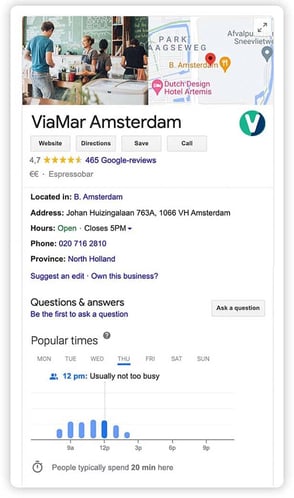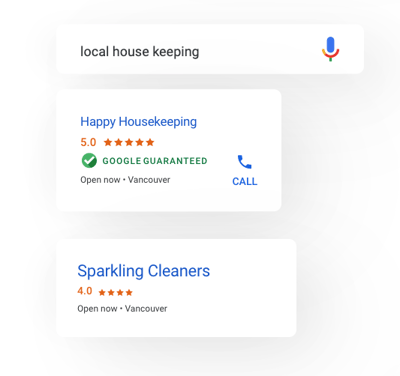
What you need to know about local online marketing
Last updated: October 3, 2025
Where local marketing meets local search, the goal is typically to drive traffic to a business location or their website. The means are offering localized content to customers on the go, which reaches them through local marketing techniques. Local marketing is, predictably, about the local customer. So, it's important to know what you need to do to stand out from other local businesses, and how to attract the attention of potential customers.
In this article, we’ll cover the ins and outs of local marketing. You'll learn how to locally focus your content to win customers, hearts, and most significantly, wallets!
What is local online marketing?
Put simply, local online marketing refers to a mix of digital marketing strategies that local businesses can use to engage with new and prospective customers within a targeted —often small— geographical radius. Local marketing is typically used by businesses with a physical storefront, like hotels, restaurants, medical offices, etc.
It's important to note that local online marketing is not the same as local marketing. While the former is primarily based on the Internet, the latter is focused on in-person marketing strategies. Pound-for-pound, though, it's the former that can bring you the most bang for your buck. People rely more and more on digital to make purchasing decisions. Search queries that contain "open near me" have grown globally by over 400%. This shows an important trend that local online marketing isn't just an overhyped buzzword; it's a money-making, crowd-pulling juggernaut.
In the following chapters, we'll take a closer look at strategies that can make your local online marketing campaign an instant success.
Local search optimization
Let's set the stage with a quick definition.
At its core, local search is the use of special search engines that allow users to find what they're looking for in geographical proximity to them. For example, when a user types a query such as "restaurants near me", these search engines (think: Google, Bing, and the like) submit a geographically constrained query against a database of local businesses.
According to Go Gulf, 46% of all Google searches are looking for local information. Meanwhile, the SEO Tribunal says that 97% of people learn more about a local company online than anywhere else. The bottom line? Most customers will search online to learn about the businesses in their area, from comparing prices to reading reviews. And this trend won't die away any time soon. If you fail to prepare for these customers, you're basically waving goodbye to a steady stream of local traffic, and consequently, higher profit margins.
For you to improve your local SEO game, you'll have to nail down a few best practices:
Claim your local listings on Google with a business profile
One in three customers will do a local search on a mobile device before they visit a business. Guess where these customers find the information they're so ardently looking for? Your Google Business Profile, of course!
To make the most of Google Business Profile, start by setting up an account. Simply visit google.com/business and verify ownership of your business. While you're at it, be sure to accurately fill out information regarding your business, including:

- Business name;
- Address;
- Contact info;
- Product offerings;
- Response to customer reviews;
- Official business hours;
- Directions;
- Official business website;
- And so on.
Beyond these essentials, you can optimize your Google Business listing as well. Optimization can take several formats and it's a necessity to continually invest time and effort in keeping your Business Profile relevant and up-to-date.
That means regularly checking all information is accurate, adding highly engaging and optimized photos, taking advantage of any new features as they become available, and using Google Posts as much as possible. You'll also need to:
- Use photos that paint your business in the best possible light;
- Ensure you're using relevant keywords in all the right places (including in your business name, if possible);
- Select the correct business or category type;
- Use the Google Q&A feature as much as possible to add depth and credibility to your listing.
If all this sounds like too complex a task, you can always seek the help of a local online marketing agency near you.
→ Want to learn more about using Google for Local Marketing? Also read: Google Local Campaigns: boost sales in your physical location
Make sure your info is consistent across all platforms
This is pretty much a no-brainer. Make sure that your basic info (like name, address, and phone number) is the same on every platform where you have a presence. This will help Google link your listings together, understand your reach, and display accurate information to customers.
Take time to develop your About Us and Home Pages
These pages are leading in showing your products, so make sure to fill them with important local keywords. In addition, add quality content and your business information to beef up the pages' visibility.
Reviews and ratings
Simple question: Which business would you rather go with—one with a 5-star overall rating and some glowing reviews, or one with a 2-star rating and medium reviews?
We're willing to bet that'll you go with the first option.
Why? Because there's nothing that local customers trust more than online reviews. While reviews for your company are important in general, reviews directly tied to your local store carry much more local weight. In other words, bad ratings can seriously hurt your local online marketing efforts, so it's pretty much a no-brainer to get on the good side of local customers and garner as many positive reviews and stars as you can. That means encouraging your local customers to leave reviews at every opportunity.
These metrics have consistently been proven to be an accurate measure of credibility (or lack thereof). In fact, according to Qualitrics, a whopping 93% of customers say that online reviews greatly influence their purchasing decisions. On the other hand, 91% of consumers between the ages of 18 and 34 trust online reviews just as much as personal recommendations.
The good, the bad, the recommendations

Positive reviews tell customers what you're doing right. It could be anything from
the quality of the product you sell to the customer service provided when customers call with a problem. In other words, a positive review puts you in the good graces of your local target audience and brings you one step close to winning a repeat customer.
Negative reviews, on the other hand, can badly hurt your company's reputation and turn away prospective customers. However, deleting bad reviews from your website can be detrimental to your local business as well. It's best to have (just!) a few bad reviews to make your business seem more legitimate and credible. After all, to err is human, and nobody likes a perfect person and by extension, a perfect business.
To improve your online reviews and ratings, keep these simple tips at heart:
- Thank positive reviewers and let them know how much their review means to your business.
- Set up social media accounts and actively engage with your customers. When you get questions or concerns regarding your business, respond to them as quickly and thoroughly as you can.
- Reach out to negative reviewers, express your genuine(!) apologies for their bad experience, and promise a better experience next time out.
- Provide incentives to everyone who leaves a positive review on your website or social media accounts. This could be anything from offering free gifts to running a giveaway contest.
- Give customers a good enough reason to review you. It may be something as simple as writing a personalized thank you note, but that gesture will go a long way in making your local customers feel appreciated.
Focus your content locally
There's a reason we talk about content as though it's royalty. You can have the best products and services, but if your content doesn't resonate with your local audience, you'll find your strategies landing you on page 2 of SERPs. And if we're being honest, you won't sell much from page 2.
The current evolution and sophistication of search engines means that the importance of high-quality content only continues to increase. Local entrepreneurs have to leverage opportunities by creating content of genuine interest and value to target audiences.
Here's how you can create content that deeply resonates with your local customers:
1. Conduct incisive keyword research
Keyword research can be challenging. But since you, as a local entrepreneur, regularly talk with your customers, you have a big advantage.
Ask them about their search behavior, patterns, and preferences. Better still, ask your repeat customers what they were searching for when they first visited your website. Or what they search for when looking for your type of business. It's all valuable information that you can use to create a robust content strategy.
2. Focus on writing local headlines
Your audience is searching for the bakery around the corner, that plumber nearby, or the carpenter that'll come to their house. They click on those results that indicate they're situated in that area. That's important for your local marketing online strategy.
Make sure the snippet of your web page that Google shows in the search results is clear about where your business is. That means optimizing the titles and meta descriptions of your posts and pages for local SEO. Use the recently launched Google SERP preview tool to visualize how your website will appear in the search results and make changes were needed.
3. Give your blog a proper revamp
No matter how many bells and whistles your blog has, if it's not talking to the local audience, it's of no use. Simple as that.
People want to know what makes your business unique; what sets it apart from the rest. In other words, write valuable, highly-targeted local content, and you could earn yourself a lot more than just a bevy of positive comments; you could earn yourself an army of faithful customers.
Want to get started with local online marketing?
We can all agree that local online marketing has immense potential. All you have to do is narrow down your audience, send them the right messages, and watch as your foot traffic grows. You get more results with a limited scope and subsequently smaller effort. It's up to you to put your best foot forward.
Are you thinking of investing in local online marketing but don't know where to start? Or are you wondering how to get started with local online marketing solutions? Fret not —Marvia can help.
Marvia's all-in-one distributed marketing platform helps local businesses maximize productivity and brand consistency through centralization while offering local partners the tools to capitalize on local market insights. Capitalize on local market knowledge, and make campaigns that are tailored to your local markets.
Want to elevate your local online marketing presence? Schedule a demo with Marvia, and let's develop a tailored strategy to boost your digital visibility.
> Click here to request your free demo today!
